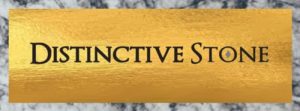FAQs
We will do our best to answer any questions you may have below.
If you can’t find the information that you’re looking for please call our Showroom & Factory for further advice on 0754 555 721
Your Order
Yes we do have some samples available at our showroom. We don’t have samples of all the stone that we offer, however if there is a sample you are particularly interested in we can contact our suppliers for a sample.
Come in to our showroom and take a look! It’s difficult to pick a stone online as there are so many unique variations to each piece. The best thing to do is come in and see us so that we can guide you through our range and answer any questions that you may have
At Distinctive Stone it typically takes 7 to 10 days for your order to be fulfilled. We can estimate your job in 24 hours, with no obligation.
Warranty on your purchase is dependent on the product that you choose and the manufacturers own warranty options. Please speak to us directly about any warranties that may apply to your preferred stone choice.
Bookmatching is the practice of matching two (or more) stone surfaces so that the adjoining surfaces mirror each other, giving the impression of an opened book. For example, two opposing faces of stone slabs are polished to create a mirror image effect using the pattern of the stone, like butterfly wings opening up. This is a very effective look for wall panels.
The largest seamless piece of stone that we can do is 3200mm x 1600mm. This is a jumbo piece of stone, and is only available for particular colours. Other pieces of stone come in the standard size of 3000mm x 1600mm.
Should you wish for a different surface area, we can join pieces of stone together, however, it is best to speak to your cabinet maker for advice on your design first.
Types of Stone and their Applications
Yes. Marble is very popular for bathrooms due to the soft and elegant patterns and light colours that marble’s/limestone’s and travertine’s offer. It is important that natural stone is sealed correctly in the wet areas.
Yes, 20mm thick slabs are often used for this purpose to create a very seamless, luxurious look.
It is not typically recommended that engineered stone is used outside, doing so could void your manufacturer’s warranty.
Exposure to direct sunlight for extended periods can cause colour fading, therefore engineered stone is not recommended for use in exterior applications where the product is exposed to direct sunlight.
Consult with our experienced stonemasons for individual product manufacturers’ recommended uses.
Both natural and reconstituted Stone have a range of stone prices from low and medium through to high and top. Depending on the range that you are looking at, prices can be quite comparable between the two. As well as the size of the job, it’s worth keeping in mind that some natural stone slab sizes are quite a bit bigger than standard reconstituted slab sizes; this can allow you to get more out of one slab.
Engineered stone certainly offers a non-porous surface material that has better scratch and stain resistance properties than natural stone. It does not typically require re-sealing and is stain resistant if cleaned reasonably promptly.
Despite reconstituted stone being highly stain, scratch and heat resistant, this does not mean that it is full proof. Engineered stone’s scratch and stain resistance properties do not make it stain-proof.
We always recommend that you take care of your engineered stone and consult us if you have any questions relating to a specific product that you are interested in.
This question has many answers as it depends on what your priorities are: durability, colour or uniqueness are all factors that come into play.
Below are some of our suggestions, but they are by no means exhaustive and we highly recommend that you speak to us directly about your needs so that we can tailor our recommendations to your personal needs.
For many, the ultimate combination of quality, durability and uniqueness is encompassed by granite. In particular, darker tightly grained granite is known for its durability and is sometimes even used as exterior cladding on buildings. Granite has high stain and scratch resistance, in addition to exhibiting high heat resistance. Acidic products such as lemon juice are also not likely to affect granite. Furthermore, granite can be polished to a very high gloss level.
Quartzite has similar properties to granite and is very durable, if not more durable than granite. Quartzite differs though in that it offers colours and patterns similar to marble and sandstone. This is why Quartzite is an ideal choice for bench tops, particularly when trying to create that wow factor.
Marble is another great natural stone for those looking to create a feature island bench or splash-back with beautiful patterning and colour. However, marble is not as durable as granite and generally has a lower stain and scratch resistance too. It’s worth noting that marble does react with acidic products such as lemon juice, which can cause etching on polished marbles.
Quartz/Composite/Engineered stones are also popular for bench tops. These reconstituted stones are a durable product and because they are man-made the colour of the stone is controlled, offering very uniform subtle patterns in light/white colours, which is not available in granite. Engineered stone is also highly scratch, stain and acid resistant, but being resin based is not as heat resistant as granite. Keep in mind that reconstituted stone is not generally suitable for outdoor use as it is UV sensitive.
Travertine is a form of limestone deposited by mineral springs, especially hot springs. It is a banded, more compact form of Limestone, characterized by the many holes and chambers evident through the stone.
Travertine varies in colour from dusty whites to silver-greys, to gold, coral red and toffee, available with small holes filled or unfilled, this stone can be effectively polished creating a classy and sophisticated appearance.
Travertine is suitable for both internal and external applications.
Taking Care of Your Stone
No, it is not recommended that you cut directly on your stone tops, and always use a chopping board. Although granite and engineered/quartz (reconstituted) stone are all highly scratch resistant, they are not scratch proof.
Marbles / Travertines etc. are softer stones again and will scratch more easily, so never cut on these surfaces.
Very hot items placed directly on reconstituted (engineered) stone can cause cracks due to different thermal expansion rates. This damage caused by sudden and rapid surface temperature changes results in fractures in the stone.
We do not recommend that you ever put hot cookware directly on the surface of reconstituted stone. Therefore we advise that you always place very hot pots, pans and trays onto a wooden chopping board or heat trivet. It’s also suggested that electric fry pans and slow cookers are used on a wooden chopping board.
As a rule of thumb, natural stone can withstand more thermal expansion, therefore is more durable under heat pressure than reconstituted stone.
Marble: Yes you need to have your marble sealed with a good quality penetrating sealer as it is a more porous stone. Unsealed marble will stain more easily. Basically, sealing buys you insurance time to clean spills up before it stains the stone. Penetrating sealers do not alter the appearance or gloss level of the stone.
A penetrating sealer will get into the micro pores of the stone to reduce the ability of contaminants to adhere to the stone. They are not a coating which sits on top of the stone surface.
Although, penetrating sealers will not protect marble from etching (dull spots) as this process is a reaction between the acidic product and the very top surface of the stone.
Coating-type sealers are also available (e.g. Dry Treat’s Vitremela) which will protect the marble from etching as well as staining but does add significant cost to stone top installations.
Granite / Quartzite: Not all require sealing. Generally darker coloured granites do not require sealing at all. As a general rule, we recommend that medium to light-coloured granites be sealed, as they are generally less stain resistant than darker-coloured granites.
Sealing is often a service that is offered by stone fabricators on/before installation but there are also specialized companies such as “The Marble Man” that offer this service after tops have been installed.
We recommend that you follow the cleaning instructions provided by the brand of stone that you purchase. Each stone brand typically has a range of cleaning products that it advises you to use on their range.
You can also find some handy pieces of information about cleaning different types of natural stone in our two part blog post series: How to Clean Natural Stone Part 1 and Part 2 .




